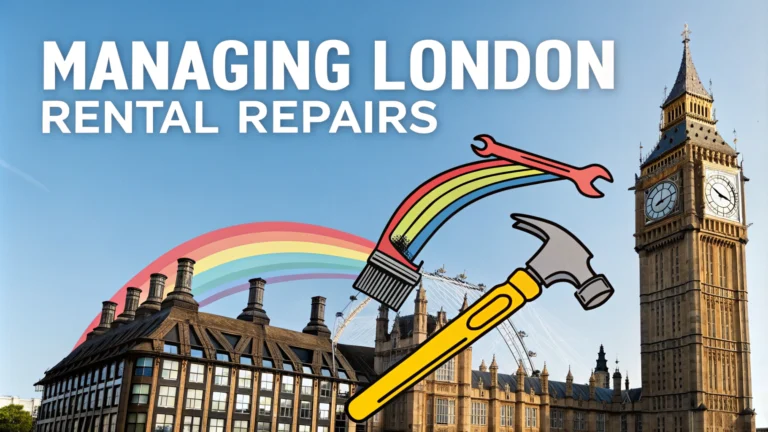London’s rental market can be complex when it comes to property repairs and maintenance, especially with specific UK regulations and tenant rights.
Understanding your rights and responsibilities regarding repairs helps prevent disputes and ensures your rental experience stays positive while living in one of the world’s most dynamic cities.
This quick guide breaks down the key aspects of managing rental repairs in London, from reporting issues to following up with landlords and letting agents.
Your Rights as a London Tenant
Under UK law, landlords must keep rental properties in good repair, including the structure, exterior, heating, hot water, gas, electricity, and sanitation systems.
- Basic structure and exterior (walls, roof, windows)
- Heating and hot water systems
- Gas appliances and pipes
- Electrical wiring
- Bathroom fixtures
- Common areas in shared buildings
Reporting Repairs in London
Always report repairs in writing (email is acceptable) and keep copies of all communications.
Steps to Report Repairs:
- Document the issue with photos
- Email your landlord/agent describing the problem
- Include date the issue started
- Attach relevant photos
- Request a timeline for repairs
Emergency Repairs
For urgent issues like gas leaks, contact National Gas Emergency Service immediately at 0800 111 999.
| Emergency | Contact |
|---|---|
| Gas Leak | 0800 111 999 |
| Power Cut | 105 |
| Water Leak | Thames Water: 0800 714 614 |
Timeframes for Repairs
Different repairs have different reasonable timeframes for completion.
- Emergency repairs (gas leaks, major electrical faults): 24 hours
- Urgent repairs (heating, hot water): 3-7 days
- Non-urgent repairs (cosmetic issues): up to 28 days
When Landlords Don’t Respond
Contact your local council’s Environmental Health Department if your landlord isn’t responding to repair requests.
Getting Help:
- Shelter Housing Advice: 0808 800 4444
- Citizens Advice: 0800 144 8848
- London Renters Union: londonrentersunion.org
Preventing Repair Issues
Regular maintenance checks can prevent major repair issues.
- Check smoke alarms monthly
- Report minor issues before they worsen
- Keep the property well-ventilated
- Clean and maintain appliances regularly
- Document the property condition with photos
Taking Action for Your Rights
Document everything and know that London tenants have strong legal protections for housing repairs and maintenance.
Useful Resources:
Legal Rights to Withhold Rent
While withholding rent might seem like a solution for repair issues, it’s legally risky in the UK without proper procedure.
- Always seek legal advice before withholding rent
- Document all repair requests and responses
- Consider rent deposit schemes for protection
- Keep paying rent while pursuing other solutions
Dealing with Letting Agents
Many London properties are managed by letting agents who serve as intermediaries.
Working with Agents:
- Check if they’re registered with a property redress scheme
- Keep records of all agent communications
- Escalate to senior management if needed
- Know your agent’s complaint procedure
Insurance and Liability
Understanding insurance coverage is crucial for protecting your belongings during repairs.
- Landlord’s insurance covers building structure
- Contents insurance protects your belongings
- Document valuable items before repairs begin
- Check policy coverage for temporary accommodation
Maintaining Your London Home
Success in London’s rental market requires understanding your rights, maintaining clear communication, and taking prompt action when issues arise.
- Keep detailed records of all repair communications
- Know your emergency contacts
- Join local tenants’ associations
- Stay informed about your rights
- Build a positive relationship with your landlord/agent
FAQs
1. Who is responsible for repairs in a London rental property?
Landlords are legally responsible for most structural repairs, heating systems, electrical wiring, gas pipes, and exterior maintenance. Tenants are responsible for minor repairs, keeping the property clean, and fixing any damage they cause.
2. How long should landlords take to complete repairs in London?
Emergency repairs (like gas leaks or major electrical faults) should be addressed within 24 hours. Urgent repairs should be completed within 3-7 days, while non-urgent repairs typically within 28 days.
3. What documents are needed when moving to London?
You’ll need proof of identity (passport/ID), proof of income (employment contract/bank statements), previous landlord references, proof of right to rent in the UK, and typically 3-6 months of bank statements.
4. How much is the average rental deposit in London?
Most London landlords require a deposit equivalent to 5 weeks’ rent for annual rents under £50,000, or 6 weeks’ rent for annual rents over £50,000, as per the Tenant Fees Act 2019.
5. What areas in London offer the best value for renters?
Areas like Lewisham, Bromley, Croydon, Waltham Forest, and parts of East London typically offer better value while maintaining good transport links to central London.
6. How far in advance should I start looking for a London rental?
Start looking 6-8 weeks before your intended move date. The London rental market moves quickly, and most properties are available for immediate move-in or within 2-4 weeks.
7. What is the process for reporting repairs in London rentals?
Document the issue with photos, report it in writing to your landlord or letting agent, keep copies of all correspondence, and follow up if necessary. Use the official reporting system if provided by your agency.
8. Are letting agent fees legal in London?
Since June 2019, letting agents cannot charge fees to tenants for viewing properties, setting up tenancies, or renewing contracts. They can only charge rent, deposits, and fees for specific circumstances like late rent payments or lost keys.
9. What council tax band should I expect in London?
London council tax bands range from A to H, with most properties falling in bands C to E. Each London borough sets its own rates, so costs vary significantly by area.
10. Do I need contents insurance when renting in London?
While not legally required, contents insurance is highly recommended as the landlord’s insurance only covers the building structure and their fixtures. Your personal belongings aren’t covered under their policy.







